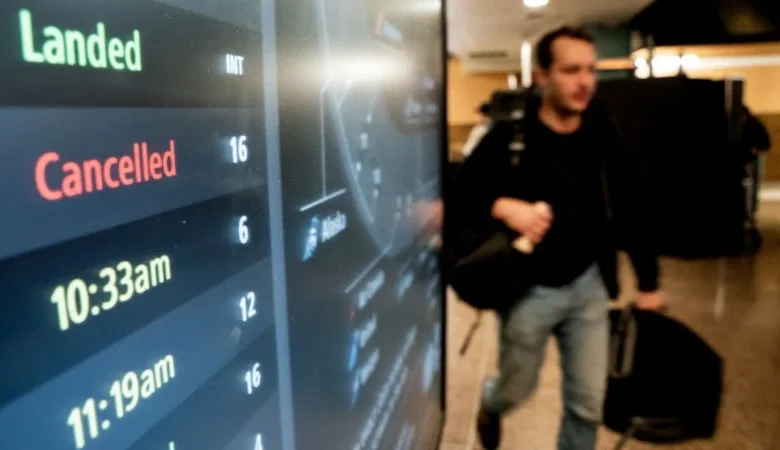Travelers face mounting delays this weekend as airlines cut hundreds of flights due to the shutdown. Here’s what to know

Disgruntled travelers across the US will face more disruptions to their plans this weekend, as airlines cancel hundreds of additional flights and delays continue to mount due to air traffic controller staffing shortages amid a government shutdown with no end in sight.
More than 1,700 flights have been canceled from Friday through Sunday, data from Cirium shows, as airlines start to implement a 4% reduction in domestic flights at 40 of the busiest airports mandated by the Federal Aviation Administration.
But the cuts – which officials say are aimed at keeping air travel safe while some of the air traffic controllers and federal security screeners missing paychecks are not showing up to work – haven’t prevented thousands of hourslong delays that have left flyers scrambling to figure out how to get to their destinations.
“I just don’t want to be stranded at the airport sleeping on a bench,” Michele Cuthbert of Columbus, Ohio, told The Associated Press, expressing concern about possible flight cancellations ahead of her trip to Dallas.
Over the next week, airlines will ramp up flight cancellations to 10% by next Friday if the government shutdown remains unsolved. And the shutdown will likely disrupt holiday travel plans if no deal is reached after next week, plunging flyers into “uncharted territory,” said former FAA deputy administrator Dan Elwell.
But travelers can still see flight cuts even if the government were to reopen next week, as the FAA’s order requires airlines to cancel flights days in advance.
Here’s what to know if you plan to travel by air in the coming days:
An emergency order by the FAA on Thursday said airlines have to cut traffic by 4%, resulting in about 800 flight cancellations for Friday that increased to over 1,000 throughout the day, according to FlightAware.
On Saturday, there were more than 1,500 flight cancellations and over 6,600 delays, according to the flight tracking website. More than 1,000 flights have already been canceled for Sunday and over 240 delayed, the data show.
The disruptions are primarily caused by air traffic controller staffing and the FAA order, but also include unrelated flight cuts.
Airlines will be required to cut 6% of their flights to those 40 airports on Tuesday, 8% Thursday and 10% next Friday if the shutdown drags on, the FAA says.
The percentage could rise to 15-20% if the gridlock in Congress doesn’t end “relatively soon,” Transportation Secretary Sean Duffy warned in an interview with Fox News.
“It’s going to very much disrupt their Thanksgiving travel plans, I’m sure,” Elwell said about the flight cuts. “And let’s just hope we don’t get there.”
Elwell, who served in the first Trump administration, said flight delays caused by the second-longest government shutdown starting in 2018 “actually brought people back to the table and ended the shutdown back in 2019.”
The effects of air travel disruptions resulting from the shutdown will likely linger even if Congress makes a deal to reopen the government, as the transportation secretary says air traffic controllers may not return to work right away.
The FAA said air control facilities nationwide were short-staffed 42 times on Saturday, according to an operations plan. And problems continue despite the flight cancellations designed to relieve stress on controllers struggling to deal with the shutdown.
Aaron Barker, an employee of the Transportation Security Administration and leader of the American Federation of Government Employees Union, said neither he nor his colleagues are able to make ends meet during the shutdown as controllers miss a second full paycheck.
“We are now at the point where today would have been a payday for officers,” he told CNN’s Victor Blackwell on Saturday. “So now I have members who are coming — they’re being evicted. Some of them are already evicted. I have one family who I just learned was sleeping in their car with children.”
More flight reductions – intended to reduce flow and maintain safety – mean the number of air traffic controllers not showing up for work will continue to rise, Elwell said.
“They’re going to have to make hard financial decisions,” he said.
Major airlines have announced further cancellations to hundreds of flights scheduled through the weekend after more than 1,000 were slashed on Friday.
American Airlines will cut 220 flights from its schedule through Monday, a spokesperson told CNN.
Meanwhile, United Airlines announced hundreds of cuts through early next week, including 168 on Saturday; 158 on Sunday; 190 on Monday and 269 on Tuesday.
Southwest Airlines will cancel about 100 flights Saturday and 150 Sunday to comply with the FAA order, saying in a statement the carrier has already reduced its schedule by 4% through Monday at 34 of the 117 airports it serves.
The vast majority of Southwest flights, however, will not be disrupted, said the airline, which is contacting affected customers directly.
More than 140 Delta and 140 Delta Connection flights have also been canceled. “Additional cancels for Sunday can be expected,” the airline said in a news release.
Major airlines like American, Delta, Southwest, United and Frontier are all waiving fees for passengers who want to change their tickets.
Airline officials like Frontier’s CEO Barry Biffle are urging people to book a separate, backup ticket on another carrier if they don’t want to risk being stranded when their flight is canceled.
Try to mitigate any headaches from delays and cancellations by avoiding booking flights with layovers, nonprofit US Public Interest Research Group says, and opt to make reservations directly with the airline rather than a third-party website.
Other useful tips for travelers include proactively checking your flight status in case airlines don’t send out alerts; paying for flight disruption coverage or travel insurance with a credit card; and knowing you’re entitled to a full cash refund if your domestic flight is canceled or delayed over three hours, according to guidance from Brian Kelly, founder of travel website The Points Guy.
What airports are seeing flight delays and cancellations?
The nation’s busiest airports were hit hardest as the shutdown’s ripple effects spread across nearly every part of the air travel network on Friday – the first day of the Trump administration’s mandatory cuts to reduce US air traffic – and continue into the weekend.
The three major airports servicing the New York City area are experiencing hourslong delays on Saturday due to staffing shortages, according to the FAA.
A ground stop was temporarily issued for flights traveling to Newark Liberty International Airport Saturday after the FAA noted flights into the airport were delayed an average of over four hours earlier in the day.
Flights coming into LaGuardia Airport were delayed nearly an hour, while departures were also delayed an average of 75 minutes and increasing. And those headed to John F. Kennedy International Airport are delayed an average of over 2.5 hours, while departures from the airport are currently delayed an average of 105 minutes.
Additionally, flights arriving at Hartsfield-Jackson Atlanta International Airport are delayed an average of five and a half hours, the FAA said.
On Friday, Washington, DC’s Reagan National Airport faced the most severe disruption, with nearly 80 flights canceled and almost half of all arrivals delayed, according to tracking site FlightAware.
Chicago O’Hare, Atlanta’s Hartsfield-Jackson International, Denver International and Dallas-Fort Worth also experienced dozens of cancellations and hundreds of delays, FlightAware data show. On the West Coast, Los Angeles International and San Francisco International reported similar issues.
Other affected airports include Boston Logan, Phoenix Sky Harbor, Seattle-Tacoma and Orlando International, all reporting slowdowns heading into the weekend.
Internationally, major hubs like Amsterdam Schiphol, Toronto Pearson and Tokyo Haneda, saw cancellations climbing into the double digits.





